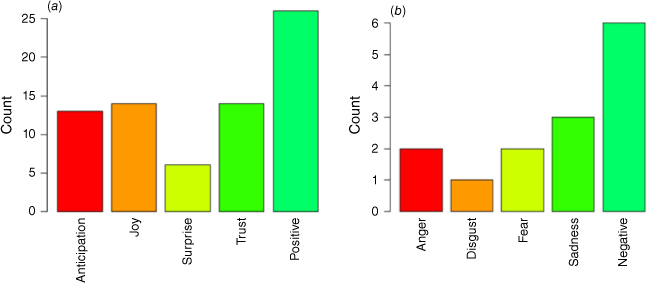Students’ perspectives on a podcast-based assignment exercise, while learning to communicate about infections and vaccines
Charmaine Lloyd A * , Pragalathan Apputhurai A and Ali Al-Rubaie AA School of Health Sciences, Swinburne University of Technology, Hawthorn, Vic. 3122, Australia.

Charmaine Lloyd has been a microbiology educator at the polytechnic and university level and has been teaching microbiology to students in biomedical science, health science, life science and veterinary bioscience. She is passionate about developing innovative and creative learning & teaching approaches. She has published and presented papers on blogging, scenario-based learning, podcasts and work integrated learning. In the laboratory space, she is interested how microbiota contribute to the wellbeing of the host, group A streptococci, opportunistic infections and microalgae. |

Pragalathan Apputhurai has been a statistics and mathematics lecturer for over 10 years at university level. He has an extensive track record of teaching in applied statistics in health sciences, business, and engineering at undergraduate and postgraduate levels. He is passionate about implementing newer approaches for more engagement and better student experience in learning. |

Ali Al-Rubaie is a health science educator and researcher in the field of neuroscience, traumatic brain injuries, brain imaging and pathological inflammation. He has experience teaching units in pathology, neuroanatomy and neuroscience among other medical sciences, and also works on designing new collaborative learning technologies for students. |
Microbiology Australia 44(3) 156-161 https://doi.org/10.1071/MA23038
Submitted: 28 March 2023 Accepted: 25 June 2023 Published: 26 July 2023
© 2023 The Author(s) (or their employer(s)). Published by CSIRO Publishing on behalf of the ASM. This is an open access article distributed under the Creative Commons Attribution-NonCommercial-NoDerivatives 4.0 International License (CC BY-NC-ND)
Abstract
Podcasts are used in educational institutions to complement learning and revision. In this paper, the incorporation of a student-created podcast component into a group assignment on vaccines was evaluated. It was hypothesised that group podcast preparation would enable health-science undergraduate students to improve their health communication and digital literacy skills. Students (n = 66) were introduced to the assignment early in semester 2 of 2022, after which they attended regular coursework and training on podcasting software. Students had the opportunity to research, plan, script, curate and record their podcasts, actively engaging in a social constructivist learning approach. The audio conversation was recorded in a mock roleplay setting between health experts and laypersons, both played by students. The content comprised scientific aspects, conflicting opinions and contemporary issues on the vaccine topic, in the context of a lay-audience scenario provided in the assignment. The packaged podcast was graded for soundness of content, roleplaying, ability to engage the listener and creativity. Student perspectives and feedback were collected before and after the assignment through short online surveys comprising open-ended and Likert questions. Pairwise analysis showed improved digital literacy, improved confidence in students’ own communication skills and preference for podcast assignments (P < 0.05). Positive comments included the experience of learning about vaccines, use of podcasting software and fun. Though the podcast approach took a longer time to implement, it was an effective means of facilitating group discussion on the topic and offered students a safe space to experiment communication of health and infection topics through podcast technology.
Keywords: immunology, microbiology, podcast, podcast-assignment, student-driven podcast, vaccine.
Introduction
Health science students studying infectious diseases are required to be literate of basic vaccine concepts and must be able to confidently communicate their knowledge to patients, peers and research groups in an audience-appropriate manner.1 Most students own a smartphone and can create videos, vlogs and YouTube channels.2 Though reasonably confident with internet media, some students struggle with public speaking due to lack of confidence, anxiety or poor voice quality.3 Most often, these skills are not included in graduate training. Learning during the COVID pandemic has contributed to atypical educational experiences, wherein some have had little opportunity to communicate with peers face-to-face. Given that communication and collaboration are skills that are in demand by employers,4 we as educators attempted to incorporate a more-engaging assessment tool that would facilitate active learning, promote online and face-to-face collaboration, and enhance communication skills.
Podcasts are short digital media files (audio or video) that are widely accessed over the internet. They are downloadable, free and a source of entertainment and knowledge. In the teaching space, academic instructors use podcasts to impart lesson and chapter reviews5 for on-the-go learning. Studies on podcasts created by students for learning or assessment are few but have shown positive outcomes especially fun, creativity and opportunities to become digital storytellers and self-reliance on new dissemination technologies.6–8
In this paper, we discuss how we conducted the podcast assignment and share learning points from students’ feedback. A previous group presentation assessment, on the study of a vaccine (of choice) from the Australian immunisation schedule was modified so that the presentation aspect would be in an interview-styled podcast format. Students could use a free podcasting tool available on campus (e.g. Adobe Audition) or any other. The podcast mode of assignment was chosen so that students might have an opportunity to improve their health communication and digital literacy skills.
Materials and methods
The group podcast assignment is one of the assessments in the unit, ‘Infections and Immunology in Health Sciences’, under the Biomedical Science discipline of the Bachelor of Health Science degree at Swinburne University of Technology. Students taking this unit are generally interested in careers such as infection control, health regulations, infection epidemiology. Before and after the podcast exercise, students (n = 66) were invited to participate in brief surveys (pre-podcast exercise survey, PPES, and post-podcast survey, PoPES) with or without a unique participant identifier code (UPIC). The university ethics approval reference number is 20226609-10604. The intent of the survey was to gauge students’ preferences (of assignments, podcast tools), preparation (prior and acquired) and experiences (positive and negative).
Assignment topic, assessment tools and assessment criteria
In week 1 (of a 12-week semester), students selected their assignment topic and formed groups of six using the self-assign option in the learning management system, Canvas. The assignment required students to review information about the scenarios they had chosen for study (Table 1). Students were required to synthesise literature from a variety of sources into a script for a simulated 10-min health podcast. Three students would play the role of laypersons with vaccine concerns (from controversies, vaccine failure, misinformation, antivaccination articles) and the other three students would play an expert panel offering professional advice. The latter would need to pitch their responses in an audience-appropriate manner. They were to consider that the laypersons in their scenario (Table 1) were all well-read. Vaccines selected for this assessment were from the Australian Immunisation schedule.9 A lecture on these vaccines preceded the exercise. Between weeks 5 and 7, students prepared and submitted a script of their panel discussions with citations, through Turnitin on the Canvas learning management system for feedback from tutors.
| Sample scenarios for creating podcasts between an expert panel and a group representative of the public |
|---|
| Parents of a newborn are concerned about giving their infant the vaccine ______. |
| (a) H-B-VaxII Paediatric or Engerix (against Hepatitis) |
| (b) Infanrix hexa [against Diphtheria, tetanus, pertussis (whooping cough), hepatitis B, polio, Haemophilus influenzae type b (Hib)]. Any two. |
| (c) Rotarix (against Rotavirus) |
| (d) M-M-R II or Priorix |
| High school goers vehemently protest against ____ and refuse the dose unless properly convinced. |
| (a) Gardasil9 |
| (b) Nimenrix |
| A pregnant mother refuses ___. Let us assume that she lives in an area endemic for pertussis. |
| (a) Boostrix or Adacel |
| A group of 70-year olds want your opinion on ____ as they don’t see the point of being vaccinated in their silver years. |
| (a) Prevenar 13 |
| (b) Zostavax |
| (c) Pneumovax 23 |
A training session was provided by an in-house Adobe Audition specialist on how to create and edit audio files for podcasts. Students were free to use other software. A sample lesson plan may be found in our paper on lesson plans for podcasting in class.10 Suitable examples of podcasts were shared with students, e.g. American Society of Microbiology podcasts (see https://asm.org/Podcasts). Students were free to be creative with sound, voices and flow of content.
Students were provided a simple rubric of four criteria as a marking guideline:
the overall quality of the written draft (resources, referencing, flow of detail, packaging of facts, academic integrity) (20 marks, with 10 marks for overall packaging; 10 marks for individual contribution);
how engaging the podcasts were (10 marks);
roleplaying (10 marks, with 5 marks for overall score; 5 marks for individual score); and
podcast packaging, sound quality, timing, flow of conversation (10 marks).
Students answered the PPES survey in week 1 and the PoPES survey in week 11. Questions are listed in Table 2 along with the analysis.
| Independent samples (range: 43–45) | Paired samples (n = 22) | Independent samples (range: 35–37) | Paired samples (n = 22) | ||
|---|---|---|---|---|---|
| Pre-podcast survey (PPES) | Mean (s.d.) | Mean (s.d.) | Post-podcast survey (PoPES) | Mean (s.d.) | Mean (s.d.) |
| Question 1. How do you feel about preparing a podcast assignment on vaccines for this unit? (scale 1–5; 5-most confident) | Question 1. How did you feel about preparing the group podcast assignment on vaccines? (scale 1–5; 5-most confident) | ||||
| I am confident using the internet and Swinburne library resources to source for peer reviewed resources to prepare my podcast script. | 4.40 (0.94) | 4.45 (0.86) | I am more confident using the internet and Swinburne library resources to source for peer reviewed resources to prepare my podcast script | 4.46 (0.77) | 4.50 (0.67) |
| I have good oral communication skills | 4.16 (0.95) | 3.68 (0.95)* | I discovered I have good oral communication skills | 4.31 (0.83) | 4.19 (0.87)* |
| I have experience in recording my voice on my phone and laptop. | 4.55 (0.85) | 4.60 (0.66) | NAA | ||
| I have experience in recording my voice on a podcast software | 3.44 (1.62) | 3.26 (1.5) | NA | ||
| I am open to trying Adobe Audition software (provided by Swinburne) to make a podcast | 4.00 (1.18) | 3.73 (1.28) | 4.16 (0.99) | 3.55 (1.41) | |
| NA | 4.05 (0.95) | ||||
| I can improve my personal digital literacy toolkit by engaging in creating podcasts for health. | 4.07 (0.88) | 3.82 (0.66)* | I feel I have improved my personal digital literacy toolkit by engaging in creating podcasts for health | 4.11 (1.06) | 4.27 (0.88)* |
| Group work while preparing podcast assignments is likely to be more engaging | 3.95 (1.18) | 4.00 (1.07) | Group work while preparing podcast assignments was engaging | 4.11 (1.06) | 4.05 (1.05) |
| Question 2. What is your opinion of learning together while preparing different modes of assignments? (scale 1–5; 5-you prefer this the most) | Question 2. After this experience with preparing a podcast assignment, what is your opinion of learning together while preparing different modes of assignments? (scale 1–5; 5-you prefer this the most) | ||||
| Written group assignments | 3.50 (1.19) | 3.35 (1.03) | Written group assignments | 3.38 (1.36) | 3.36 (1.26) |
| Group presentations | 3.63 (1.12) | 3.48 (0.99)* | Group presentations | 3.86 (1.21) | 4.00 (1.13)* |
| Group podcasting | 3.80 (1.13) | 3.74 (0.92)* | Group podcasting | 4.16 (1.12) | 4.26 (1.05)* |
| Question 3. Which podcast tool would you recommend to other students, based on your experience? | |||||
| Adobe Audition | 37 | 25 | |||
| Other | LogicPro (1), GarageBand (10, Capcut (1), Soundtrap (1), iMovie (1) | ||||
| Question 4. Share with us your positive experiences while preparing this group project on a vaccine podcast | Open question (illustrated in Fig. 1 and 2) | ||||
| Question 5. Share with us your negative experiences while preparing this group project on a vaccine podcast. | Open question (illustrated in Fig. 1 and 2) | ||||
Probabilities are significant at: *, P < 0.05. Pre- and post-podcast assignment survey questions are in bold and responses are in plain text.
ANot asked in the PoPES – as by then all students had prepared their assignment using microphones, laptops and at least one software.
Data analysis
Responses provided without a UPIC were analysed under the independent sample columns and those with UPICs were analysed as paired samples. Non-parametric independent sample (Mann–Whitney U test) and paired sample tests (Wilcoxon signed-rank test) were employed to check whether the mean score differences for each question before and after the assignment exercise, were statistically significant using SPSS (ver. 27, IBM). The level of significance used was alpha = 0.05. R sentiment analysis was performed on answers to open-ended questions.
Results and discussion
Of 66 students in the class, the PPES questions were answered by 43–45 students and the PoPES was answered by 35–37 students. Some students did not answer all the questions, hence a range is provided. Only 22 responses were paired. Both independent and paired analyses showed similar results (Table 2).
Students’ confidence in using online resources for preparing scripts were not significantly different (n.s.) before and after the exercise. Their confidence in their own speaking abilities seem to have increased (P < 0.05). Although most students had prior experience with recording their voices, not everyone had experience with podcast software. They were open to learning new software (e.g. Adobe Audition), but their confidence to use the software did not increase. From the comments, some found the software difficult to use. At the end of the assignment, only 68% (25 of 37) of students preferred Adobe Audition, whereas others either did not respond or preferred other tools. As a result of this experience, students felt that they improved their personal digital literacy toolkit (P < 0.05). Students agreed that group podcasts could be engaging at the start, and they continued to agree to the same at the end. They were in favour of doing podcasts and group presentations over written group assignments (e.g. reviews). This could be interpreted as students’ desire for more group interaction. It was heartening to note, that despite the extra steps of having to learn a new software, synthesise scripts from diverse materials and record a podcast, doing a podcast assignment in future was still preferred (Table 2) (P < 0.05).
Responses from open-ended questions on positive and negative experience categories were screened for words or phrases by the method of Braun and Clarke.11 Positive experience descriptions (n = 36) could be grouped into seven themes and negative experiences (n = 21) were grouped under two themes (Fig. 1). Positive group experiences (helping each other, contributing, engaging and learning together), learning of the podcast technology, and the fun experienced during the exercise were the top three positive themes. R package for sentiment analysis was also performed on the data and revealed similar results wherein ‘anticipation, joy, surprise and trust’ featured among positive emotional tones, and ‘anger, disgust, sadness and fear’ featured among negative emotional tones. The majority of negative experiences were a reflection of comments on difficult group experiences (often caused by non-contributing members) and difficulties with working with the podcast software (Fig. 2).
Tree map of (a) positive experience themes and (b) negative experience themes extracted from students’ free text comments.

Inferences and implications for using student-driven podcast assignments
The general observation from this study on how students perceived preparing a group podcast assignment seems optimistic. Similar to the experience of other educators,7,12 running of the exercise was dependent on several aspects – the podcast objectives, students’ motivation, group preparation, quality participation, the experience of learning, tutor’s encouragement, guidance and feedback. This assignment provided social constructivist opportunities for students to network in person with their peers and to improve interpersonal skills, which wasn’t possible during the COVID pandemic. As in other similar studies,7,8,12 students found the approach ‘fun’ and a good experience.
The main (a) positive and (b) negative sentiments extracted from the open-ended responses using R sentiment analysis.

In prior assignments, e.g. group presentations, students would often choose review articles over actual studies for references. They would rarely browse through grey literature and news articles for contemporary issues, which is important for a broadened outlook and engagement13 with issues beyond core scientific knowledge. Examples in this context include policies, vaccine failures, antivaxxers. In this exercise, a wide array of information had to be read, to come up with the content. Additionally, with ChatGPT taking over as an assistant for student essays,14 asking students to formulate scripts for debates might be a solution for more active reading and synthesis of authentic discussions.
For this task, students were required to do the same amount of reading as they would have for a group assignment, review or presentation, except that in a podcast, they would need to learn how to articulate this information to various lay audiences. Communicating health information to patients is a key skill that health practitioners need to develop; hence, this project gave students a space to go beyond creating written assignments, wherein they would find their own voice and reflect on how it would sound while discussing matters with their study participants or patients.15
Podcasts, like scholarly outputs, have the potential to reach a wide global network for critical discussion; hence, it was important to impart to the students the value of curating their scripts with the tutor before recording. Having done these steps at an undergraduate level, students would remember these skills in communication-based professions.
In this digital age, it is advantageous if students leaving university are fluent with digital software for communicating health topics. In this exercise, we made available Adobe Audition software and training and that program was accepted by the majority as a preferred podcasting tool, even though there were mixed responses on its ease of use. Unlike the formal manner in which typical academic group presentations and reviews are conducted; in podcasts, students could use music, sound effects, dramatic articulations of their voice and empathy while communicating in their mock panel discussions. Hence, this was evidence that students understood the value of not only using their knowledge in an intelligent discussion, but also communicating it in an interesting and non-technical manner for various lay audiences. Students were allowed to change their names in podcasts (while sharing correct identities for grading) and this was appreciated by those who were not confident of their communication skills, as they were able to experiment in a safe space.
The podcast-based learning exercise was not without flaw. The sample size was small. As noted from the students’ negative experiences, similar pressures found in other types of group assignments could be seen (participation of individuals, varying quality of work, free-loading, assignment rescue).16 Learning how to use podcast software also required extra time, both for the tutor and students.
The blended nature of this assignment offered opportunities for meeting face-to-face in class, out of class and online. Literature review and podcast script preparation offered prospects for various facets of the Bloom’s taxonomy to be addressed in infectious disease health education: knowledge and comprehension on the disease and existing treatments; application of learned knowledge to concepts on the vaccine; analysis and evaluation of various reports on vaccine outcomes; synthesis of collaborative findings on these vaccine issues into a meaningful podcast that could be used to fairly address public concerns about various vaccines.17
Conclusion
Student-driven creative interview panel podcasts on vaccine topics (and potentially other scientific topics) have the ability to not only enhance but transform the way students learn. This learning and assessment approach can be tailored to a variety of disciplines and is a valuable tool for faculty seeking to develop innovative education programs.
Acknowledgements
We are grateful to Ms Natasha Hobbs, Learning Designer, Swinburne University of Technology, who provided ample guidance and support through the study.
References
1 Lorini C et al. (2018) Health literacy and vaccination: a systematic review. Hum Vaccin Immunother 14, 478-488.
| Crossref | Google Scholar |
2 Morgan H (2013) Technology in the classroom: creating videos can lead students to many academic benefits. Childhood Educ 89, 51-53.
| Crossref | Google Scholar |
3 Grieve R et al. (2021) Student fears of oral presentations and public speaking in higher education: a qualitative survey. J Further Higher Educ 45(9), 1281-1293.
| Crossref | Google Scholar |
4 Rios JA et al. (2020) Identifying critical 21st-century skills for workplace success: a content analysis of job advertisements. Educ Res 49, 80-89.
| Crossref | Google Scholar |
5 Cho D et al. (2017) Podcasting in medical education: a review of the literature. Korean J Med Educ 29, 229-239.
| Crossref | Google Scholar |
6 Almendingen K et al. (2021) Small group student-produced podcasts were favoured as assignment tool for large-scale interprofessional learning: an exploratory study among health, social care, and teacher education program. Front Educ 6, 622716.
| Crossref | Google Scholar |
7 Milligan KJ et al. (2021) Creation of a student-run medical education podcast: tutorial. JMIR Med Educ 7, e29157.
| Crossref | Google Scholar |
8 Kemp J et al. (2012) Student-produced podcasts as an assessment tool: an example from geomorphology. J Geogr Higher Educ 36(1), 117-130.
| Crossref | Google Scholar |
9 National Immunisation Program Schedule (2023). Australian Government. Department of Health and Aged Care. https://www.health.gov.au/topics/immunisation/when-to-get-vaccinated/national-immunisation-program-schedule (accessed 20 March 2023)
10 Lloyd C (2022) Co-create a podcast to learn deeply and promote public health. https://commons.swinburne.edu.au/file/6385b5c7-2813-40ea-a9ba-03eab4f80ac2/1/co_create_podcast_learn_deeply-lesson_plan.pdf (accessed 20 March 2023)
11 Braun V, Clarke V (2006) Using thematic analysis in psychology. Qual Res Psychol 3(2), 77-101.
| Crossref | Google Scholar |
12 Chan WM et al. (2011) Students’ perceptions of and attitudes towards podcast-based learning – a comparison of two language podcast projects. Electron J Foreign Lang Teach 8, 312-335.
| Google Scholar |
13 Lloyd C (2021) Blogging as a tool for real-time learning in medical microbiology. Front Microbiol 12, 576145.
| Crossref | Google Scholar |
14 Stokel-Walker C (2022) AI bot ChatGPT writes smart essays – should professors worry? Nature
| Crossref | Google Scholar |
15 Gysels M et al. (2004) Communication training for health professionals who care for patients with cancer: a systematic review of effectiveness. Support Care Cancer 12(10), 692-700.
| Crossref | Google Scholar |
16 Neu WA (2012) Unintended cognitive, affective, and behavioral consequences of group assignments. J Mark Educ 34(1), 67-81.
| Crossref | Google Scholar |


